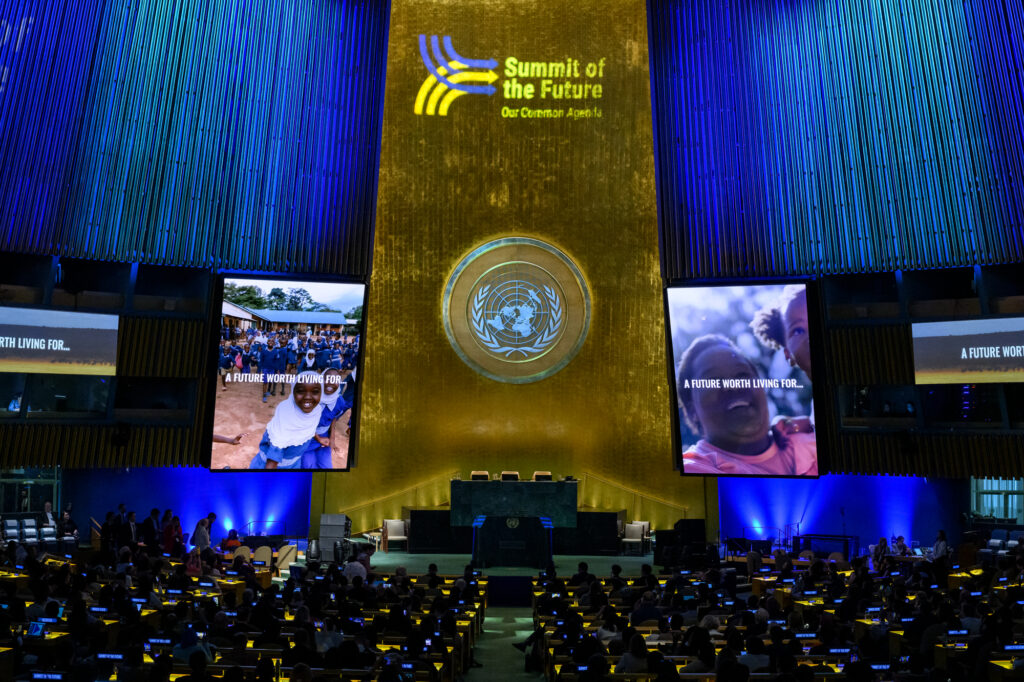Last September, world leaders convened at the United Nations Headquarters in New York for the Summit of the Future. Under the theme “Multilateral Solutions for a Better Tomorrow,” the Summit explored a forward-looking agenda, which considered, among other issues, opportunities for increased youth engagement in decision-making.
In the lead up to the Summit of the Future, more than 1,500 youth attended the Action Days. Young leaders from all over the world made recommendations, which were presented to the Secretary-General and Assistant Secretary-General for youth affairs. The Action Days set the momentum for the Summit, demonstrating the importance of engaging youth and drawing on their expertise to come up with inclusive solutions, such as rebuilding trust between institutions and young people by allowing them to play an active role in shaping decisions instead of just giving them a seat at the table.
(Im)pact for the future
The outcome of the Summit was an inter-governmentally negotiated, action-oriented Pact for the Future, which includes a Global Digital Compact and a Declaration on Future Generations.
The Pact outlines three commitments to advance the youth, peace and security agenda, which is the first international policy framework recognizing the positive role young people play in preventing and resolving armed conflict.
The commitments include:
- Taking concrete and voluntary measures to increase the inclusive representation of youth in decision-making at all levels in prevention and the resolution of conflict;
- Strengthening and implementing existing youth, peace and security national and regional roadmaps to deliver on the agenda’s commitments;
- Requesting the Secretary-General to carry out a second independent progress study on youth’s positive contribution to peace processes and conflict resolution.
Member States, international and regional organizations, civil society organizations and youth representatives at the Summit reiterated their commitment to advancing the youth, peace and security agenda, as they called for incorporating youth issues as a cross-cutting element of every discussion. Many welcomed the adoption of the Pact, seeing it as an opportunity to reinvigorate current structures and build the trust needed for effective global governance. They also cautioned that global targets will remain unmet without the full empowerment of women and youth.
Energizing youth engagement
At UNIDIR, we welcomed such developments. Recognizing the detrimental effects of marginalizing youth populations, we are committed to changing this by engaging with youth and creating conditions that allow them to progress and play an active role in shaping decisions. This will enable the international community to build a strong foundation in arms control, non-proliferation and disarmament to safeguard the interests of present and future generations – in line with The Pact and the UN General Assembly resolution on Youth, Disarmament and Non-proliferation.
As part of our youth engagement approach, UNIDIR is working on three key fronts:
1) Promoting a youth-inclusive workforce
UNIDIR promotes youth inclusion in its practices by building disarmament research capacity among the next generation. We have a well-established Graduate Professional Programme, which provides young people with practical experience in a research institute that serves the global community on questions of international security and assists with disarmament efforts. In turn, Graduate Professionals are a diverse group, often fluent in a variety of languages, that bring innovative and valuable perspectives to the field of disarmament.
2) Raising awareness of arms control, non-proliferation and disarmament among youth
UNIDIR actively engages youth in arms control, non-proliferation and disarmament issues through outreach and awareness raising initiatives. We offer an online Youth Disarmament Orientation course which provides age-appropriate content, including key concepts on disarmament and up-to-date information on relevant topics. Our work also builds knowledge, capacity and skills on disarmament by offering lectures for students in higher education institutions upon their request.
3) Fostering knowledge of youth, peace and security and amplifying perspectives
UNIDIR advances research on youth, peace and security issues, as well as engages youth in research and policy work on disarmament. We carry out research on the needs of young people during rehabilitation, reintegration and post-conflict reconstruction. We gather age- and gender-disaggregated data on youth in conflict, to understand their experiences and ensure their unique needs are addressed in programming.
Ensuring meaningful participation
Last month, UNIDIR’s Managing Exits from Armed Conflict Project in collaboration with partners held an exhibition at the UNHQ consisting of powerful photos and reflections documented by conflict-affected youth from Colombia, Iraq and Nigeria. This is the result of a participatory research intervention aiming to empower young people with photography and research skills, giving them a space to process their experiences. By sharing these through an artistic lens, practitioners and policymakers could see their experiences first-hand rather than having them interpreted by adults.
In addition to elevating youth’s voice in policymaking discussions, UNIDIR regularly promotes competitions open to young participants. Earlier this year, a youth video competition called for submissions on why space security matters and how outer space can be kept sustainable. Three winners had the opportunity to come to Geneva, where their videos were premiered at UNIDIR’s Outer Space Security Conference 2024 and they had a chance to meet with leading experts in the field. These competitions offer a platform for youth to share innovative solutions on pressing international security issues, thus playing an active role instead of just filling the room.
Inspired by the Pact of the Future, UNIDIR is committed to ensuring meaningful youth engagement in all areas of arms control, non-proliferation and disarmament.
UNIDIR would like to thank the Republic of Korea for its generous support towards the Institute’s youth engagement activities.


